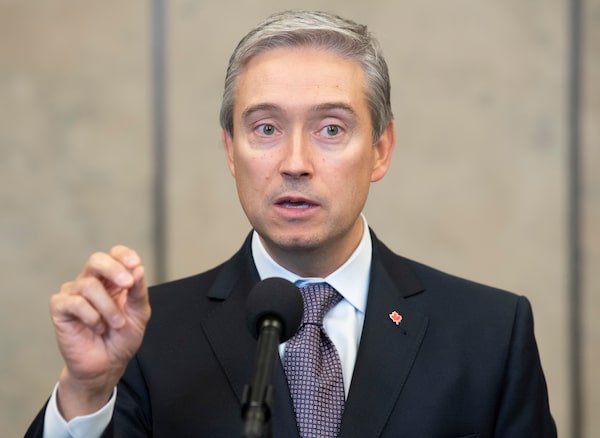
Foreign Affairs Minister François-Philippe Champagne speaks with the media after a cabinet meeting in Ottawa, Tuesday, February 4, 2020.Adrian Wyld/The Canadian Press
Canada is turning to the United Nations aviation agency for help in getting Iran to hand over the flight recorders from the Ukraine International Airlines crash that killed dozens of Canadians when it was shot down outside Tehran last month.
Foreign Affairs Minister François-Philippe Champagne spoke to his Iranian counterpart, Javad Zarif, on Wednesday, reiterating Canada’s request for a “thorough, credible and transparency investigation” into the crash. He also underlined the need for “swift compensation settlement” for families of the victims, which included 57 Canadian citizens and 29 permanent residents of Canada.
“Minister Champagne stressed the need for Iran to arrange for the download and analysis of the flight’s black-box data to be conducted without delay,” read a summary of the conversation, posted on Mr. Champagne’s Twitter account Wednesday evening.
Mr. Champagne said he and Transport Minister Marc Garneau have also asked the UN aviation agency for its help in urging Iran to give up the flight recorders, also known as “black boxes,” to France, which has the expertise to analyze them. The ministers met with the International Civil Aviation Organization’s chief executive officer and senior leadership at the agency’s headquarters in Montreal last Friday.
ICAO, which has 191 member countries including Iran, sets air-safety standards for the international community. However, the standards are non-binding. In a statement, ICAO said its council president is sending a letter to Iran’s civil aviation authority to remind it of its obligations under the agency’s convention.
“We judge Iran by their actions, not their words, and day by day,” Mr. Champagne told reporters on Parliament Hill on Wednesday. “The world is watching and saying, hold on for a minute. There’s an international convention to which Iran is a party to and they have to abide by that.”
Mr. Champagne declined to speculate when asked why he thought Iran was delaying handing over the black boxes, saying, “I work on the basis of facts.”
Flight 752 was shot down on Jan. 8, hours after Iran fired several volleys of ballistic missiles at U.S. military targets in Iraq, in response to the U.S. assassination of a senior Iranian commander. Iran’s military has since said it shot at the airliner because it was mistaken for a cruise missile.
Canada has sent consular and investigative teams to Tehran in the wake of the crash. Canada is also a member of the International Coordination and Response Group, which consists of countries that lost citizens in the tragedy. The group last spoke by teleconference on Monday and formed a sub-committee to discuss compensation with Iran, Mr. Champagne said.
One of the last channels for useful information about the crash recently broke down amid a dispute between Tehran and Kyiv. In an interview with Ukraine’s 1+1 channel on Sunday, President Volodymyr Zelensky dismissed an Iranian compensation offer of US$80,000 a victim as “too little.” Shortly after the interview aired, the same channel published a recording that appeared to confirm Iranian officials immediately knew their military had shot the plane out of the sky with a missile.
The leaked audio infuriated Tehran, which said it had provided the recording to Ukrainian investigators on the condition it remain secret. Iran said it would no longer share information with Ukraine.